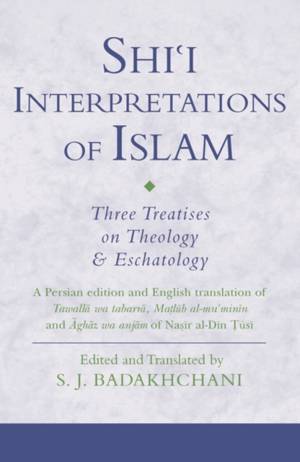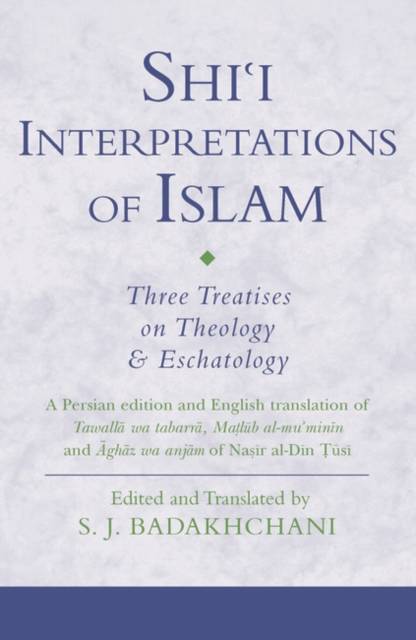
- Afhalen na 1 uur in een winkel met voorraad
- Gratis thuislevering in België vanaf € 30
- Ruim aanbod met 7 miljoen producten
- Afhalen na 1 uur in een winkel met voorraad
- Gratis thuislevering in België vanaf € 30
- Ruim aanbod met 7 miljoen producten
Zoeken
Shi'i Interpretations of Islam
Three Treatises on Theology and Eschatology
€ 93,45
+ 186 punten
Omschrijving
I.B.Tauris in association with the Iran Heritage Foundation
One of the most prominent Muslim scholars and scientists of the medieval era, the Persian polymath Nasir al-Din Tusi (1201-1274) joined the Shi'a Nizari Ismaili community at a young age, as the armies of Genghis Khan poured across his homeland. In the course of a long and eminent career, first under the patronage of the Ismailis at the fortress of Alamut, and later with the conquering Mongols, he produced over 150 works on diverse subjects from theology and philosophy to mathematics and astronomy. His principal works on Ismaili doctrine, the Rawda-yi taslim (The Paradise of Submission) and the autobiographical Sayr wa suluk (Contemplation and Action), are already available in English translation by S J Badakhchani. In this volume, he offers new critical editions and translations of three shorter Ismaili works by Tusi, namely Aghaz wa anjam (The Beginning and the End), Tawalla wa tabarra (Solidarity and Dissociation), and Matlub al-mu'minin (Desideratum of the Faithful).
In these three treatises, Tusi provides concise interpretations of key motifs in Ismaili doctrine, with special reference to the primordial nature of man, his earthly existence in relation to the imam, and his destiny in the hereafter.
One of the most prominent Muslim scholars and scientists of the medieval era, the Persian polymath Nasir al-Din Tusi (1201-1274) joined the Shi'a Nizari Ismaili community at a young age, as the armies of Genghis Khan poured across his homeland. In the course of a long and eminent career, first under the patronage of the Ismailis at the fortress of Alamut, and later with the conquering Mongols, he produced over 150 works on diverse subjects from theology and philosophy to mathematics and astronomy. His principal works on Ismaili doctrine, the Rawda-yi taslim (The Paradise of Submission) and the autobiographical Sayr wa suluk (Contemplation and Action), are already available in English translation by S J Badakhchani. In this volume, he offers new critical editions and translations of three shorter Ismaili works by Tusi, namely Aghaz wa anjam (The Beginning and the End), Tawalla wa tabarra (Solidarity and Dissociation), and Matlub al-mu'minin (Desideratum of the Faithful).
In these three treatises, Tusi provides concise interpretations of key motifs in Ismaili doctrine, with special reference to the primordial nature of man, his earthly existence in relation to the imam, and his destiny in the hereafter.
Specificaties
Betrokkenen
- Uitgeverij:
Inhoud
- Aantal bladzijden:
- 208
- Taal:
- Engels
- Reeks:
Eigenschappen
- Productcode (EAN):
- 9781848855946
- Verschijningsdatum:
- 30/11/2010
- Uitvoering:
- Hardcover
- Formaat:
- Genaaid
- Afmetingen:
- 142 mm x 216 mm
- Gewicht:
- 439 g

Alleen bij Standaard Boekhandel
+ 186 punten op je klantenkaart van Standaard Boekhandel
Beoordelingen
We publiceren alleen reviews die voldoen aan de voorwaarden voor reviews. Bekijk onze voorwaarden voor reviews.







